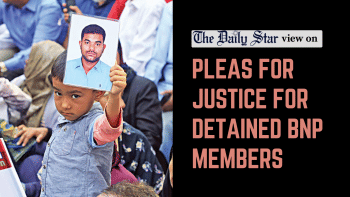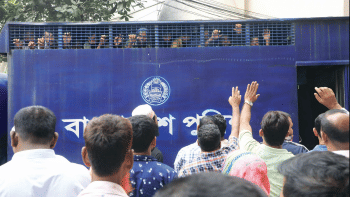Dead men tell no tales—but they do in police cases

There is perhaps no better way—than a misplaced reference to the 2017 Pirates of the Caribbean sequel—to describe some of the cases being filed by police against opposition leaders and activists. According to a report by The Daily Star, since BNP's ill-fated October 28 rally, there has been a disturbing trend of individuals—some deceased, some abroad, and some already incarcerated—being implicated in such cases over crimes they could not have committed. This further validates suspicions of the widespread abuse of authority in Bangladesh, with the government seemingly exploiting the legal system to incapacitate the opposition ahead of the election.
One of the victims is Amin Uddin Mollah, dead and buried for nearly three years. His name still popped up in a case over "attempting to kill police personnel". The officer who filed the case claimed that he "clearly saw" Amin and 21 others on the night of October 28 when they were "fleeing" after "throwing" a crude bomb at a police team. The preternatural connection made one local member comment: "I do not know if the police officer saw Amin Uddin or his ghost. Or maybe Amin Uddin came out of his grave that night." Another victim, Sheikh Mohammad Shamim, was already in jail when he was charged with arson and vandalism. Two other men were in Malaysia and Bahrain, respectively, when they were charged with committing similar crimes.
These spurious cases were filed in Gazipur, Tongi, Brahmanbaria, and Magura. But there have been similar cases in other districts as well, if media reports over the past weeks are taken into consideration. Not all "ghost" cases have been as tenuous, of course. Besides new cases, many old cases were also revived to harass, detain and, increasingly lately, convict BNP-Jamaat men, following rushed trials. Between late October and November 30, BNP claims that some 18,090 party supporters were arrested, while Jamaat claims that some 2,845 supporters were arrested. Their detentions, in many instances, have left their families in dire straits. By contrast, despite frequently abusing power or filing false cases—which is punishable under the law—Awami League men and police were let off the hook without so much as a slap on the wrist.
The incongruity between the treatments being received by the two camps is a testament not just to the politicisation of the legal institutions but also to the lack of effective safeguards against such abuses. Ghost cases are a clear violation of the fundamental rights of the accused—an affront to the very essence of law and order. Allowing them to proceed may serve a political purpose momentarily, but if left unchecked, it has the potential to cripple the entire legal system. We, therefore, urge the courts to intervene as such cases may further erode public trust in the judiciary.


 For all latest news, follow The Daily Star's Google News channel.
For all latest news, follow The Daily Star's Google News channel. 










Comments